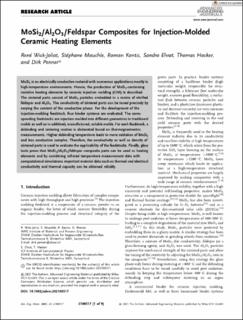Please use this identifier to cite or link to this item:
https://doi.org/10.21256/zhaw-23232| Publication type: | Article in scientific journal |
| Type of review: | Peer review (publication) |
| Title: | MoSi2/Al2O3/feldspar composites for injection‐molded ceramic heating elements |
| Authors: | Wick-Joliat, René Mauchle, Stéphane Kontic, Roman Ehrat, Sandro Hocker, Thomas Penner, Dirk |
| et. al: | No |
| DOI: | 10.1002/adem.202100517 10.21256/zhaw-23232 |
| Published in: | Advanced Engineering Materials |
| Volume(Issue): | 23 |
| Issue: | 9 |
| Page(s): | 2100517 |
| Issue Date: | Sep-2021 |
| Publisher / Ed. Institution: | Wiley |
| ISSN: | 1438-1656 1527-2648 |
| Language: | English |
| Subjects: | Binders; Ceramic injection molding; Heating element; MoSi2 |
| Subject (DDC): | 620.11: Engineering materials 660: Chemical engineering |
| Abstract: | MoSi2 is an electrically conductive material with numerous applications mostly in high-temperature environments. Herein, the production of MoSi2-containing resistive heating elements by ceramic injection molding (CIM) is described. The sintered parts consist of MoSi2 particles embedded in a matrix of vitrified feldspar and Al2O3. The conductivity of sintered parts can be tuned precisely by varying the content of the conductive phase. For the development of the injection-molding feedstock, four binder systems are evaluated. The corresponding feedstocks are injection molded into different geometries in traditional molds as well as in additively manufactured, soluble molds. For each feedstock, a debinding and sintering routine is elaborated based on thermogravimetric measurements. Higher debinding temperature leads to more oxidation of MoSi2 and less conductive samples. Therefore, the conductivity as well as density of sintered parts is used to evaluate the applicability of the feedstocks. Finally, glow tests prove that MoSi2/Al2O3/feldspar composite parts can be used as heating elements and by combining infrared temperature measurement data with computational simulations important material data such as thermal and electrical conductivity and thermal capacity can be obtained reliably. |
| URI: | https://digitalcollection.zhaw.ch/handle/11475/23232 |
| Fulltext version: | Published version |
| License (according to publishing contract): | CC BY 4.0: Attribution 4.0 International |
| Departement: | School of Engineering |
| Organisational Unit: | Institute of Computational Physics (ICP) Institute of Materials and Process Engineering (IMPE) |
| Appears in collections: | Publikationen School of Engineering |
Files in This Item:
| File | Description | Size | Format | |
|---|---|---|---|---|
| 2021_Wick-Joliat-etal_Injection-molded-ceramic-heating-elements.pdf | 2.62 MB | Adobe PDF |  View/Open |
Show full item record
Wick-Joliat, R., Mauchle, S., Kontic, R., Ehrat, S., Hocker, T., & Penner, D. (2021). MoSi2/Al2O3/feldspar composites for injection‐molded ceramic heating elements. Advanced Engineering Materials, 23(9), 2100517. https://doi.org/10.1002/adem.202100517
Wick-Joliat, R. et al. (2021) ‘MoSi2/Al2O3/feldspar composites for injection‐molded ceramic heating elements’, Advanced Engineering Materials, 23(9), p. 2100517. Available at: https://doi.org/10.1002/adem.202100517.
R. Wick-Joliat, S. Mauchle, R. Kontic, S. Ehrat, T. Hocker, and D. Penner, “MoSi2/Al2O3/feldspar composites for injection‐molded ceramic heating elements,” Advanced Engineering Materials, vol. 23, no. 9, p. 2100517, Sep. 2021, doi: 10.1002/adem.202100517.
WICK-JOLIAT, René, Stéphane MAUCHLE, Roman KONTIC, Sandro EHRAT, Thomas HOCKER und Dirk PENNER, 2021. MoSi2/Al2O3/feldspar composites for injection‐molded ceramic heating elements. Advanced Engineering Materials. September 2021. Bd. 23, Nr. 9, S. 2100517. DOI 10.1002/adem.202100517
Wick-Joliat, René, Stéphane Mauchle, Roman Kontic, Sandro Ehrat, Thomas Hocker, and Dirk Penner. 2021. “MoSi2/Al2O3/Feldspar Composites for Injection‐Molded Ceramic Heating Elements.” Advanced Engineering Materials 23 (9): 2100517. https://doi.org/10.1002/adem.202100517.
Wick-Joliat, René, et al. “MoSi2/Al2O3/Feldspar Composites for Injection‐Molded Ceramic Heating Elements.” Advanced Engineering Materials, vol. 23, no. 9, Sept. 2021, p. 2100517, https://doi.org/10.1002/adem.202100517.
Items in DSpace are protected by copyright, with all rights reserved, unless otherwise indicated.